Straight-edge hardcore outfit Orthodox comes from Nashville, Tennessee, where, despite the city’s reputation as country music’s capital, there’s a thriving underground heavy music scene. More unorthodox, perhaps, is that until recently Orthodox weren’t even an actual band.
Orthodox was founded in 2011 by vocalist Adam Easterling as essentially a solo project, with producer and multi-instrumentalist Daniel Colombo providing the soundtrack to Easterling’s rage via nu-metal-esque grooves, twisted guitar tones, and atonal unease. Screaming out of the gate, Orthodox’s 2017 debut Sounds of Loss—with its unrelenting heaviness and lyrical themes about revenge, loss, and punishment—had many fans believing the band had perfected its delivery. But the outfit’s new release, Let It Take Its Course, pushes the heaviness, missives, and raw voltage to the next level. And much of that is thanks to the addition of Austin Evans on guitar.
Evans joined Orthodox in 2018, though his connection to the band goes back even further. “A few years back, a friend and I drove to Nashville from South Carolina to go to a Hanging Moon show,” he says. “I didn’t know them yet, but Orthodox was also playing the show. And ever since I witnessed that, I was like, ‘Dude, I have got to move here.’”
And move he did—but not before a network of scene connections linked him to Easterling for a fill-in spot on an Orthodox tour. That quickly evolved into full-time membership and the chance to write and record for Let It Take Its Course. The guitarist wears his love of Slipknot’s chaotic power on his sleeve, as revealed by Evans-penned tracks such as “Why Are You Here?”—with its feedback intro and relentless, jackhammer riffs.
From Evans’ and Colombo’s sharp-to-sludgy guitar tones to Easterling’s throat-thrashing bark, Let It Take Its Course refuses to relent. The only reprieve is “Cut,” which begins as a ballad before leaping into mayhem—juxtaposing clean guitar and melodic vocals with some of the album’s most massive, fat-grooved moments. Oh, and in a development that probably few in Orthodox’s crowd expected, Let It Take Its Course features a guest appearance by none other than Billy Ray Cyrus guitarist Chris Condon. (More on that in a bit.)
As with so many other bands, things were going great for Orthodox—what with the new album and a successful tour—until COVID-19. They’ve joined thousands of others around the world on indefinite hiatus. As hard as it’s been on the group, it’s perhaps been hardest on Evans, who had just relocated to a new city and was building a new life around a new band.
“As far as playing shows and stuff, there’s nothing going on,” says Evans. “And because I moved from South Carolina to here, I haven’t been able to get any benefits or anything. But I’m ok. I just don’t know how long this is going to be.”
When we spoke with Evans, we discussed Orthodox’s current situation, what it’s like playing in one of his favorite bands, his expanding role in the group, and why, despite everything, he’s still glad to be playing metal in Nashville.
You’ve only been in Orthodox for a couple of years, but you’ve made a big impact. How did you come to join the band?
I saw Orthodox as a fan back in 2016 at a show in Nashville. I didn’t know anything about them. I loved their whole dynamic. They released Sounds of Loss, and I was super, super into that record. It was one of my favorite records from 2017. But I didn’t think I would ever end up in the band. I knew Mike White, who plays drums for them. So one time when Orthodox came to town he told me they were down a guitarist. I confronted him at a show and said, “Hey man, if you guys need a guitarist, I’m not doing anything. Let me know.” He said he would give the word to Adam.
Following that, Adam DMs me on Instagram. I gave him my number, and he texted me this huge paragraph about, “Hey man, we have this tour coming up in November—a full U.S. tour with Left Behind and Spite. If you want to fill in on guitar, that’d be awesome.” I was actually already in Nashville with a few of my friends, hanging out. I thought, “This is crazy!” I didn’t expect it at all. The offer was set. I accepted it. We all meshed pretty well. Things took off from there.
I did that first tour with Orthodox in November 2018. Same for our bassist, Shiloh Krebs. We found out that the dynamic is pretty sick, and we all mesh pretty well together. Eventually, it came to be, “Hey, do you guys want to play full time?” Then, in 2019, Adam asked me if I wanted to start helping him write the new record.
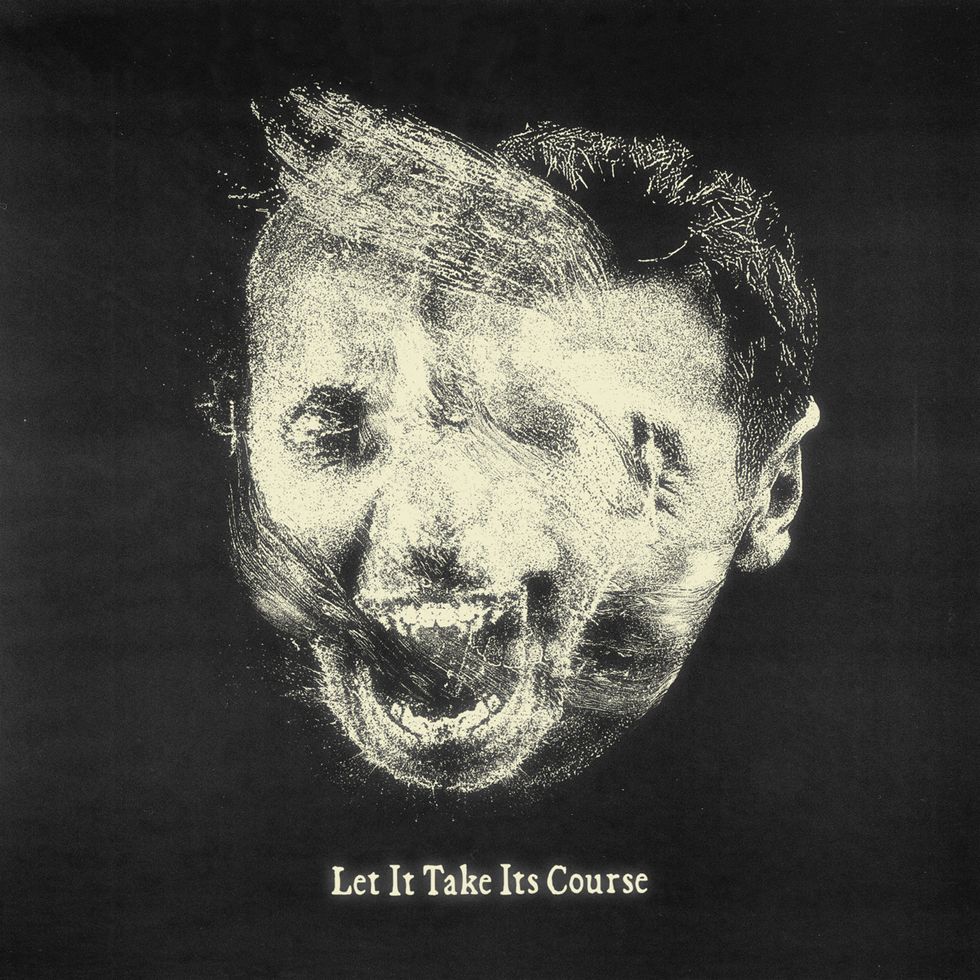
TIDBIT: Guitarist Austin Evans plugged into some heavy horsepower to get his raging tones on Orthodox’ latest: a block-letter Peavey 5150 and a Fortin Meshuggah head.
So you relocated to Nashville, right?
Yes, I moved here in December 2019. But I haven’t really lived here yet, because I moved towards the end of December and worked all of January and February. Then in March I was out on tour with Orthodox. But with this quarantine stuff, I’ve been spending all the time in the world here now. [Laughs.]
What’s it like being a metal musician in Nashville?
I first got into music around 2012 or 2013, in South Carolina. The music scene out there is kind of rough. I mean, you would have maybe 60 or 70 kids come out to a show on a good night. Nobody there ever wanted to tour or take their band to the next level, but this is all I want to do. The first show I went to in Nashville was that Orthodox show in 2016. It was one of the coolest shows I’d ever been to. It was in a house and packed out. Everybody was going ballistic, and everybody’s having fun. I could tell right off the bat that it was a super supportive hardcore scene. Everybody was backing each other up and promoting each other. People take music so seriously in Nashville, and there’s all kinds of music. It’s everywhere. It really is Music City.
Orthodox is known for bringing a nu-metal influence to hardcore. Is nu-metal an influence on your playing, too?
Growing up, I was into all different kinds of metal. I grew up on thrash metal like Slayer, Metallica, Megadeth, and Death. Then there was a time where I visited my mom, and she was seeing this guy who had a whole music collection with all types of CDs. There was a Slipknot CD called 9.0: Live, where they played everything off of the first three records. I went upstairs, put it on, and listened to it all the time. I fell in love with Slipknot. I was into that fast, crazy, insane music.
When I listened to Sounds of Loss, I could tell it was in drop-B tuning, like a lot of Slipknot songs. And it had similar super-creepy guitar riffs. That’s all I need in a band. That’s why I fell in love with Sounds of Loss and Orthodox.
When it comes to writing riffs, I always think of crazy Slipknot stuff. It’s got to be fast, it’s got to be punchy, it’s got to be heavy, it’s got to be something crazy. It can’t be too slow. There are some slower songs on the record, but my take on Orthodox is chaotic all the time. That’s how I want it to be.
At a Minneapolis show, Austin Evans kicks out the jams with his Seymour Duncan Black Winter-equipped ESP LTD M Series and trusty Peavey 5150. Photo by Cam Smith
Up until this point Orthodox has been Adam’s project, and yet you contributed to the new album.
Basically, before I joined, Adam would go in with our friend Daniel Colombo, who tracks, mixes, and masters the whole thing. Adam will sing riffs and explain what he wants to Dan. Adam doesn’t play guitar, so Dan would take care of the instruments and bring his ideas to life.I think they got five or six songs into this album before I was introduced. When Adam asked if I wanted to help write the new record, it was a tough question. With me liking Sounds of Loss as much as I did, I now had to live up to the standard of a band that I really looked up to. Now I had to take a crack at it and see what I could do.
The first song I wrote was “I Can Show You God.” Adam was super excited. He said, “This might be my favorite song that we’ve written. I want you to continue to write riffs and help write the new record.” So I also ended up writing “Look at Me,” “Why Are You Here?” and a skeleton of the song “Cut.”
You weren’t the only guitarist on the album. Who else played on it, and what did you record?
I tracked all of the songs I wrote. Dan crushed the other songs. And Chris [Condon, Billy Ray Cyrus guitarist] recorded the very end of “Cut.” For the clean guitar that drifts off into nothing, Chris pulled out some single-coil guitar and threw it on a clean channel with a bunch of reverb. He made it super clean and pretty.
What do you think separates Let It Take Its Course from Sounds of Loss, musically?
The new songs have a lot more structure to them than the old songs. But it’s kind of hard for me to answer that because I don’t really know anybody’s writing process with the first record. All I know is that playing those songs live is a lot of fun. What I could tell is that there are a lot of repeating parts throughout the old songs. And the older songs that repeat themselves a bunch are the most well known. They’re songs like “Panic,” “Second Best,” and “I’m Scared of You.” So if there’s anything that I’d want to work on, it’s to get better at repeating parts and making them interesting.
The guitar sounds really raw throughout the album. How did you and Dan keep it so consistent?
We used a block-letter [Peavey] 5150 and a Fortin Meshuggah head. I think they only made 50 of them. They’re fucking $4,000 or $5,000, and Dan got one! He said, “Hey, man, do you want to track with this?” I was like, “Fuck yes!”For the left-side guitar, we used the Fortin, and then we used the 5150 for right side. I don’t exactly remember what overdrives we used. Every pedal that was used was all Dan. I don’t know a goddamn thing about his pedalboard. He did it for me. If there’s anything that was used that wasn’t reverb or delay, it was either a phaser or a chorus pedal. Orthodox is super reliant on chorus and phaser to amplify certain sounds and make them sound creepy. If you listen to “The Anticipation,” on the first record, the weird harmonic sound wouldn’t happen unless you crank the fucking chorus pedal all the way. I think it was Adam and Tyler Williams, the old guitarist, who figured that out. Also, in heavy-ass parts of the record, we would hit an octave pedal. You would have the drop B, but then there would also be an undertone of a double drop B. It sounds massive. I do it live too. I’ll use the DigiTech Whammy DT, which has the Drop attached to it. I don’t remember the pedal we used on the record, but it’s practically the same thing.
How about guitars?
I used my ESP LTD M Series, which has Seymour Duncan Black Winter pickups. They sound sick. I’m not too big on active pickups. I think passives sound way tighter and way cleaner. So I wanted to use the guitar on the record because I knew it would fit the sound so well.
When you play live, do you try to recreate the sounds on the album, or do you stick to a rig of your own?
My live rig is a block-letter 5150 cranked up to 6 on the gain, 8 on bass, at half on mids, 6 on treble, resonance on 10, and presence on 6 1/2. My pedal setup is that drop-tune Whammy that goes into a [TC Electronic] PolyTune tuner, then into a Maxon OD808—that’s the best overdrive you can have. Then there’s the chorus pedal, which I think is called Wet Dreams by a company called Deadbeat. I actually didn’t buy it. I stole it off my old guitarist from my other band. Sorry about that, Tyler Washington! [Laughs.] And finally, that goes into a [ISP] Decimator II and into an MXR Carbon Copy. I don’t run anything to the effects loop. Another pedal I use for all of our bass drops and samples throughout the set is the Boss RC-3 looper. I run from the RC-3 into a DI box into the PA.
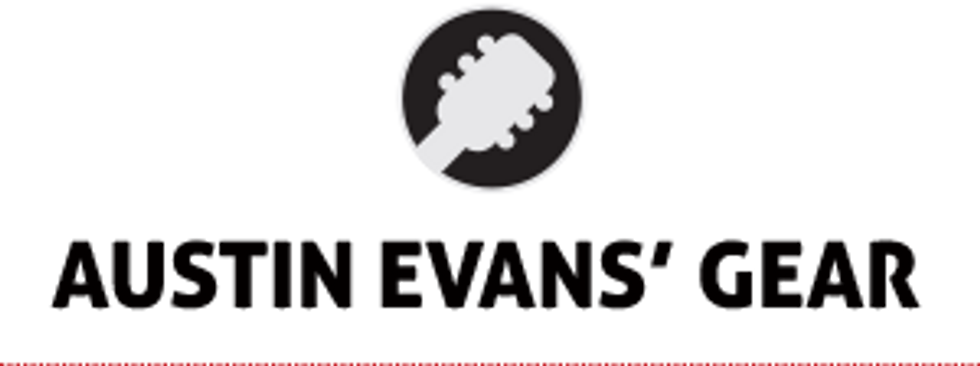
Guitars
ESP LTD M Series with Seymour Duncan Black Winter pickups
Amps
Peavey 5150
Orange PPC412 4x12 with Celestion Vintage 30s
Effects
TC Electronic PolyTune Mini
DigiTech Whammy DT
Maxon OD808
Deadbeat Sound Wet Dreams
MXR Carbon Copy
ISP Decimator II
Strings and Picks
D’Addario NYXLs (.011–.056)
Dunlop Tortex 1.14 mm
Speaking of playing live, the coronavirus has changed everything—especially for bands where touring is vital for survival. How has all this affected Orthodox?
I got back from tour and fucking everything was fucked. We weren’t anticipating it to come to an end as early as it did. We were supposed to go until March 22, but we ended up stopping on the 13th or the 12th. It bummed me out pretty hard because we got the news literally three hours before we were supposed to play. It was, “All right, this is the last show” but we had fucking 10 days left! I got paid out from the tour, and I think, “Things are fine. I’ll hit up my old manager and go back to work.” Then I got a call from him saying, “Well, you’ve been temporarily terminated. We can’t have people in a restaurant at this time.”But I have been using this time to focus on writing and finishing up an EP for my other band. And Adam and I have already been talking about writing new Orthodox stuff. So I am being productive and keeping my train of thought going with music.
That’s a hard hit to take.
Dude, our record-release show was supposed to be at the end of the tour! It was supposed to be March 27, and they had to cancel it. I’m pretty fucking sure we almost sold it out, but we had to give out refunds. We also had restocked on merch before it got shut down, so we were left with a bunch of that. We ended up putting it all online.
Tell us a bit about your other band.
I sing in a band called A Dozen Black Roses. We put out an EP three days before we left for the first Orthodox tour. I wrote the whole thing with my buddy Marcus Wickham, who was my roommate. That band has been my backup band whenever Orthodox isn’t doing anything. I write everything for it. It’s me and Marcus—who plays in another band called Early Humans—and Blake Hardman from Counterparts plays guitar. And James Chatham and Kelly Cook from 30 Nights of Violence play bass and guitar. Adam’s project is Orthodox, and this project is mine. It’s on Apple Music and Spotify.
It sounds like you have a very close-knit musical community. Everyone seems to play in bands with everyone else.
When I started A Dozen Black Roses, I still lived in Charleston. I only knew Marcus. He was the only person I could think of to record drums, and he’s one of my best friends. But he lived in Nashville, so I came her to Nashville and we recorded it. That’s when I went to that house show with Orthodox in 2016. All of my friends that I’m close with and are talented musicians live here. Living in a city where there’s nothing going on, nobody’s a musician, and nobody wants to take music seriously bummed me out. I wanted to be close with a group of people like me. I didn’t realize how big the hardcore and metal scene is here. Everybody is super supportive of each other. It was a refreshing restart.
Austin Evans and the rest of the current Orthodox touring lineup in the official video for the title track from Let It Takes Its Course.




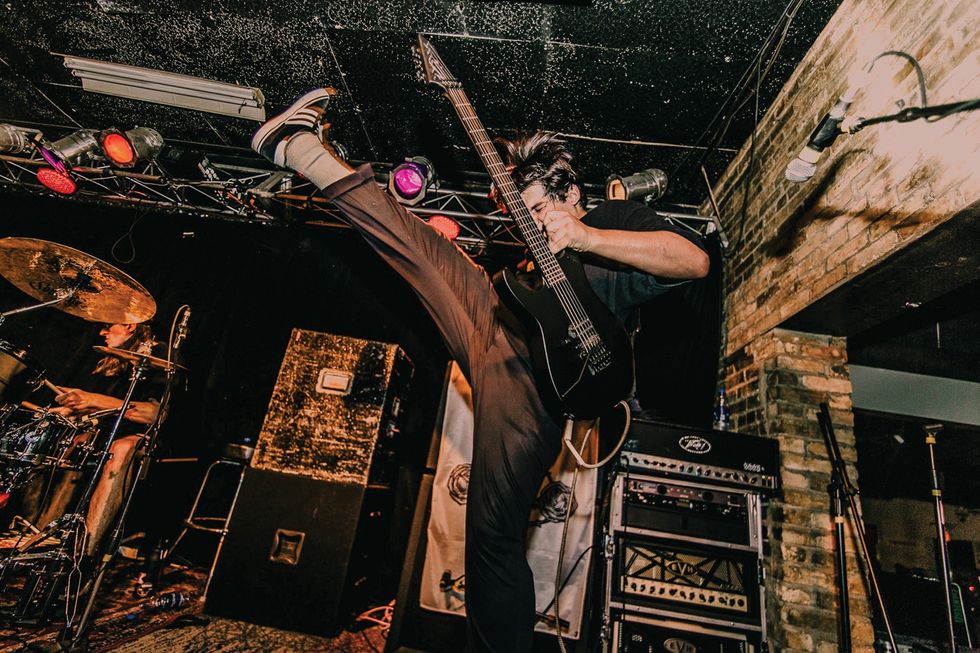





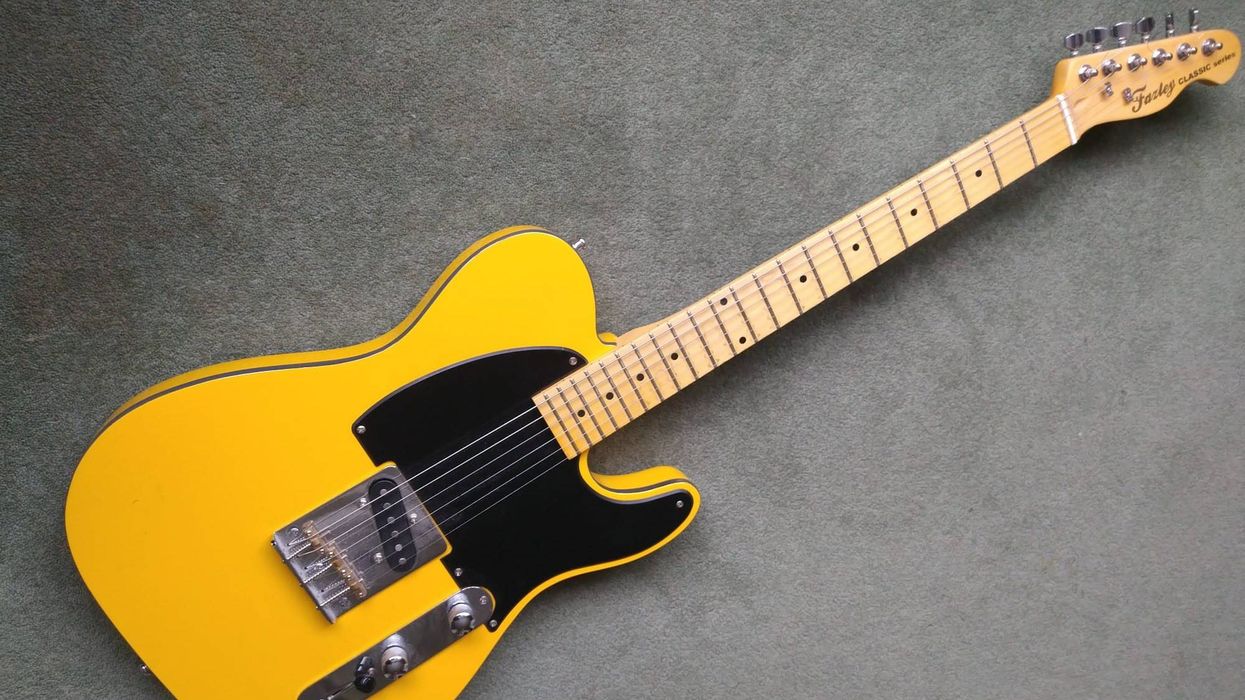


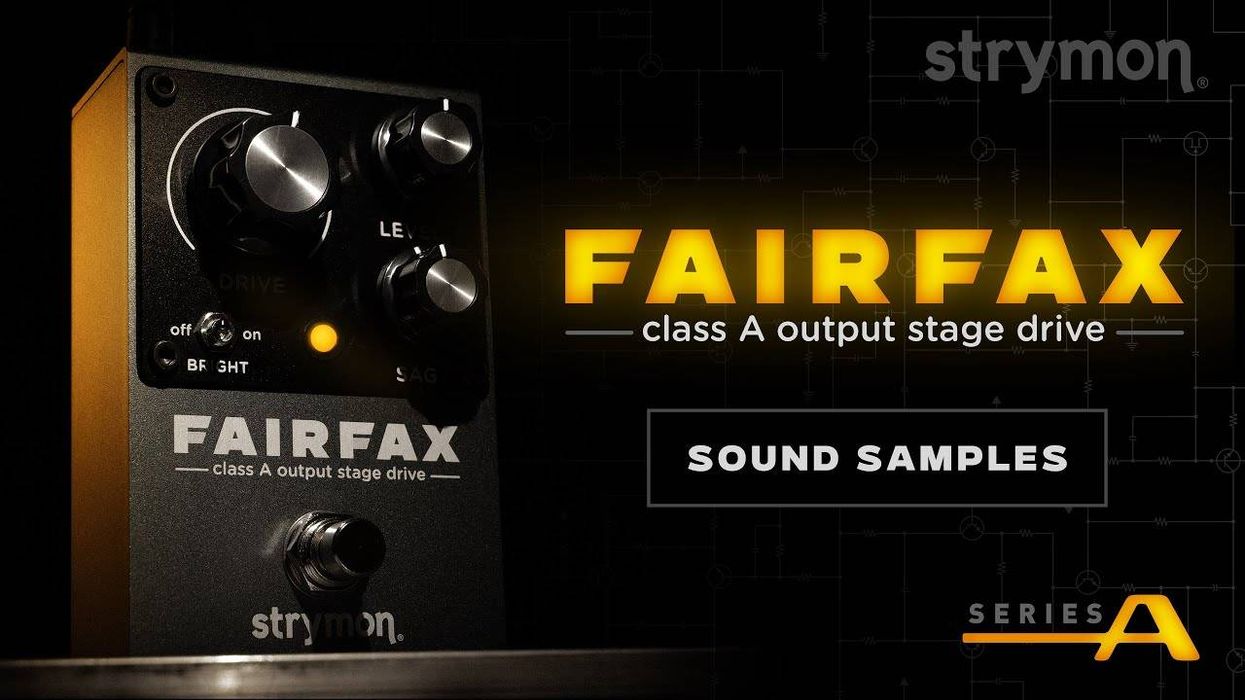

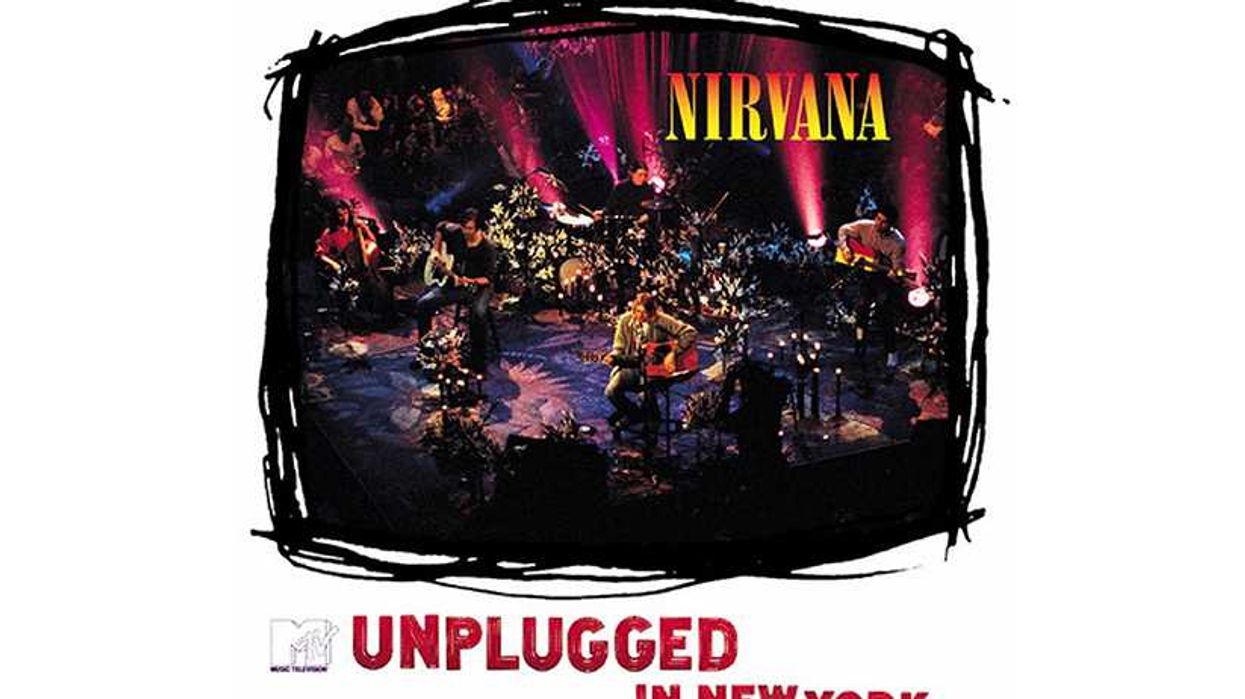
![Rig Rundown: Russian Circles’ Mike Sullivan [2025]](https://www.premierguitar.com/media-library/youtube.jpg?id=62303631&width=1245&height=700&quality=70&coordinates=0%2C0%2C0%2C0)
















![Rig Rundown: AFI [2025]](https://www.premierguitar.com/media-library/youtube.jpg?id=62064741&width=1245&height=700&quality=70&coordinates=0%2C0%2C0%2C0)




















 Zach loves his Sovtek Mig 60 head, which he plays through a cab he built himself at a pipe-organ shop in Denver. Every glue joint is lined with thin leather for maximum air tightness, and it’s stocked with Celestion G12M Greenback speakers.
Zach loves his Sovtek Mig 60 head, which he plays through a cab he built himself at a pipe-organ shop in Denver. Every glue joint is lined with thin leather for maximum air tightness, and it’s stocked with Celestion G12M Greenback speakers.






